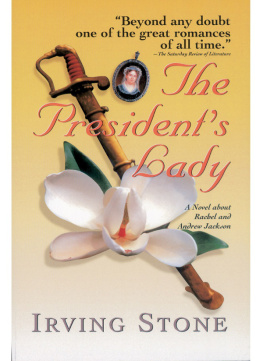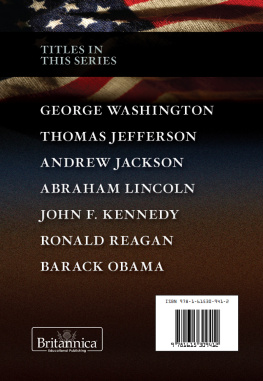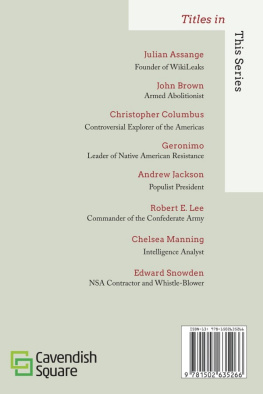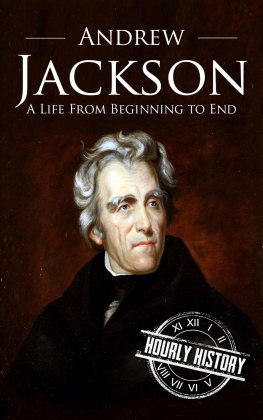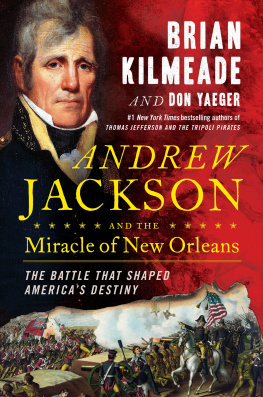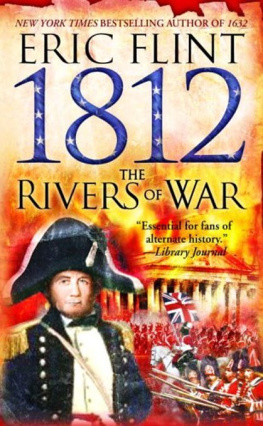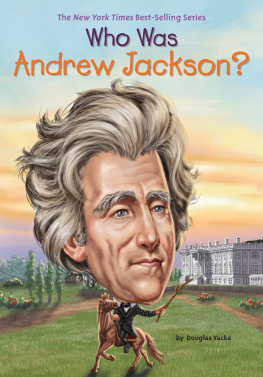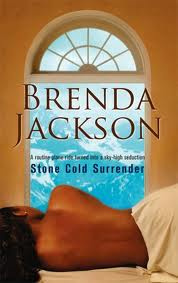The
Presidents
Lady
Copyright 1951 by Irving Stone
Reprinted by arrangement with Doubleday, a division of Bantam Doubleday Dell Publishing Group, Inc.
All rights reserved. Written permission must be secured from the publisher to use or reproduce any part of this book, except for brief quotations in critical reviews or articles.
Published by Rutledge Hill Press, a division of Thomas Nelson, Inc., P. O. Box 141000, Nashville, Tennessee 37214.
Typography: E. T. Lowe
Cover and interior design: Robert Schwalb
Library of Congress Cataloging-in-Publication Data
Stone, Irving, 19031989
The presidents lady : a novel about Rachel and Andrew Jackson / Irving Stone.
p. cm.
ISBN 1-55853-431-8 (pbk.)
1. Jackson, Rachel, 17671828Fiction. 2. Jackson, Andrew, 17671846Fiction. 3. Presidents spousesUnited StatesFiction. 4. Married womenUnited StatesFiction. 5. PresidentsUnited StatesFiction. I. Title.
PS3537.T669P7 1996
813'.52dc20
96-32822
CIP
Printed in the United States of America
08 09 10 11 12 RRD 11 10 9 8 7
TO JEAN
(for her creative editing)
CONTENTS
T HIS IS A BIOGRAPHICAL NOVEL; IT differs from a historical novel in that it does not introduce fictional characters against a background of history, but instead tells the story through the actual people who lived it and helped make it happen. The history to be found within its pages is as authentic and documented as several years of intensive research, the generous assistance of the historians and librarians in the field, and literally thousands of books, magazines, pamphlets, newspapers, diaries, public records, correspondence and collections of unpublished memoirs and doctoral theses can make it. At the back of the book the interested reader will find a bibliography of some hundred and fifty volumes actually used in the construction of this novel.
The interpretations of character are of course my own; this is not only the novelists prerogative but his obligation. Much of the dialogue had to be recreated, but every effort has been made to create it on the basis of individual character, personality, temperament, education, idiosyncrasy, as well as recorded conversations and dialogue, memoirs, diaries, letters and published accounts by relatives, friends, associates, even of detractors and enemies. The language of the day was more flowery and formal than our own; I have attempted to tell the story in a simpler English, but I have striven constantly to make certain that the difference is one of words, and never of thought, feeling or meaning.
I wish to acknowledge the constant help afforded me by such Jackson and Tennessee historians as Marquis James, whose definitive and highly readable biography of Andrew Jackson is the authority in the field; Alfred Leland Crabb, who took countless hours away from his double task of teaching and writing to tackle difficult research problems; Gerald W. Johnson, for permission to quote from his life of Jackson; Allan Nevins, who helped guide my attitudes toward the characters in this story; Robert T. Quarks, Tennessee State Archivist, who made a special study for me on the early Tennessee militia; Dr. Dan M. Robison, Tennessee State Librarian, who helped with the research; and to Paul I. Wellman for stimulating my interest in the Jackson story. Arthur M. Schlesinger, Jr.s study of the older Jackson was a constant help.
In Tennessee I am indebted to Jordan Stokes III, who introduced me to the Cumberland Valley and looked up many obscure legal records; Stanley F. Horn sent me special material on the Hermitage; Mrs. John Trotwood Moore made available to me many of the Donelson family documents, as did Mary Hooper Donelson Jones. Louis D. Wallace sent me publications of the Tennessee State Department of Agriculture; the Ladies Hermitage Association, Mrs. Robert F. Jackson, Regent, was helpful in detailing the personal possessions of the Jacksons at the Hermitage, in particular the library. In Los Angeles I am indebted to Dr. Emil J. Krahulik for material on obstetrics in the beginning of the nineteenth century; Dr. George McCollister afforded me information on animal husbandry; Louis M. Brown helped me with a study of the marriage, separation and divorce laws in America at the end of the eighteenth century. In Washington, D. C, Maurice Paris was indispensable in my work among the Jackson papers in the Library of Congress; Brigadier General Eustace M. Peixotto, U.S. Army, Ret., made a study for me at the Library of Congress of the military books that would have been available to Andrew Jackson in 1792.
I am deeply indebted to the Library of Congress and the Carnegie Institute, both of Washington, D. C.; to the Library of the University of California at Los Angeles, which gathered old and rare books for me from all over America; and to the Joint University Library, Nashville, Tennessee; to the libraries of the Universities of Kentucky, Virginia, Minnesota, California, for their cooperation in lending me these books.
I RVING S TONE
June 6, 1951
T HEY EMERGED FROM THE DARK woods and were suddenly in the hot September sunshine. At the bottom of the hill their horses stopped to drink from the shallow stream.
Would you like to rest for a spell, Rachel, and freshen? Well be home by sundown.
Id rather push on, Samuel, if its the same to you.
He seemed relieved. Why was her own brother so constrained with her? No matter how serious the charges, she had expected support from her family.
They crossed the bottom lands and made their way up the trail to a timbered knob. She paused for a moment to let the cool wind of the uplands blow through her abundant black hair, refreshing her. For the first time in the four days since they had left Harrodsburg she began to feel clearheaded.
Its strange, she thought, during the long week that it took for my husbands message to reach the Cumberland and for my brother to come for me, I was too wretched to worry about anybody but myself. Yet the moment we were on the trail for home I began to think about Samuel and how hard he has taken my misfortune. If I greet my mother and brothers and sisters with the same stricken face I showed to Samuel, Ill make them all as wretched as I was.
I must think this thing through, come to some sort of understanding with myself before we reach home. Was I really guilty of misconduct? If so, how? If I wasnt guilty, then why has this happened to me? Ive got to dig down to the root, no matter how bitter it may be to chew on.
She looked across at her brother, the change in her mood communicating itself to him. She had a mirror in her saddlebag, but she had no need for one at this moment: she and Samuel, who was a year younger, were alike as twins. She saw his warm brown eyes, so quick to pain and hurt, proffering her a tiny tentative smile; the thin, curved black eyebrows; the small but immaculate white teeth, showing between the expressive lips; the thick black hair, worn over the ears, pulled back tight and tied low on the neck with a thong; his contour, inclined to exposed roundness, unprotected against the world. He had not been judging her; his confused and troubled expression had been but a true reflection of her own.
Though she had not seen her family for three years there had never been any question in her mind as to which one of her seven brothers would make the dangerous trip to fetch her. They were the youngest and gayest of the Donelson family; when her father was home he had taught her to read and write, but when he was away on surveying trips or treaty-making with the Indians, she and Samuel had studied together from the leather-bound handwritten arithmetic book in which they learned about division of decimals and the double rule of three. Samuel had been clever with books, and their father, who was an intensely religious man, had imagined that at long last he had a son who would follow in the footsteps of his great-grandfather, the clergyman who had helped to found the first Presbyterian church in America.

